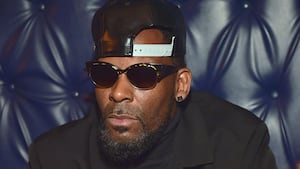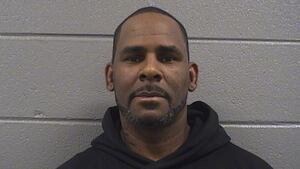On Feb. 22, music star R. Kelly was indicted on 10 counts of aggravated criminal sexual abuse. The following day, a judge in Chicago set the singer’s bond at $1 million on charges Kelly sexually abused at least three underage females from 1998 to 2010. He must surrender his passport and may not have contact with anyone under 18.
“I think all the women are lying,” Kelly’s attorney Steve Greenberg said when he spoke to throngs of media outside the 1st District police station after Kelly turned himself in to the police.
As this latest chapter unfolds, it’s sobering to consider how so many have known so much for so long, and why things finally reached a possible tipping point a decade after he went on trial for child pornography charges, two decades after that infamous sex tape, and 25 years after an annulled marriage to his teenage R&B protege Aaliyah scandalized his image forever. A few hit albums, a few classic Chappelle’s Show sketches—the darkness was a footnote to the story of Robert Kelly to a generation that still preferred to turn a blind eye to the transgressions of popular men. This January, Lifetime’s harrowing docuseries Surviving R. Kelly drew attention to the women who’d accused the singer of abuse over the years and the aftermath was significant: radio stations pulled his music, former collaborators apologized, and his label dropped him.
We engage with celebrity in a far less starry-eyed way than we once did, but even as the world knew of R. Kelly’s actions, the music industry and his legion of fans enthusiastically sidestepped the reality. When Aaliyah re-emerged alongside Timbaland and Missy in the late-‘90s, it was as if her peers, colleagues and audience all silently agreed to never acknowledge what had happened to her. She was a star reborn, with a bold new sound and image. And Kelly continued to collaborate with everyone from Celine Dion to Jay-Z, as if the world didn’t know he’d “married” a 15-year old. They remained two of the biggest stars in R&B, yet somehow publicly avoided each other’s orbit over the next three years until Aaliyah’s untimely death in 2001.
As has become apparent in the wake of allegations against famous and powerful men, the entertainment industry is an incubator for toxicity. Money and fame always hold such sway, and recent allegations against famous musicians by the women around them further indicate a culture that hasn’t really addressed its own iniquities.
Singer-songwriter Ryan Adams was the subject of a New York Times exposé detailing allegations that he engaged in inappropriate conduct with women as he “dangled career opportunities,” including one sexually explicit text correspondence with a 14-year-old girl. “Mr. Adams unequivocally denies that he ever engaged in inappropriate online sexual communications with someone he knew was underage,” Adams’ lawyer Andrew B. Brettler claimed. In one of the texts with the teenager, an aspiring bassist, he reportedly wrote: “If people knew they would say I was like R Kelley [sic] lol.”
Adams’ ex-wife, This Is Us star Mandy Moore, is also quoted in the piece. “His controlling behavior essentially did block my ability to make new connections in the industry during a very pivotal and potentially lucrative time—my entire mid-to-late 20s,” she says. The women reportedly found common ground in shared experiences. “What you experience with him—the treatment, the destructive, manic sort of back and forth behavior—feels so exclusive,” Moore recalled. “You feel like there’s no way other people have been treated like this.”
Many commentators have pondered whether the music industry will ever be rattled as foundationally as Hollywood has been by #MeToo, but even if there is no easy flashpoint to rally behind, it’s clear that there is heightened awareness. The legacy of Surviving R. Kelly and those who have worked to keep a light on decades of abuse should be a wider recognition of what we’ve gotten so very wrong in the past.
Kelly’s position of influence directly shapes how his story has unfolded—it gave him the sway to bring young women into his orbit and shielded him after allegations became a constant of his public persona. Considering some recent headlines, it’s easy to see how such toxic patterns continue to swirl throughout the music industry.
Last fall, singer Justine Skye tweeted that she’d suffered through a traumatic relationship. “Recently I’ve had one of the scariest/heart breaking experiences in my life and it’s still hard for me to talk about,” she wrote. “I felt stupid, angry, depressed...blamed myself. Trying to figure out how someone who claimed they loved me so much could find such evil within themselves to hurt me mentally and physically.”
Skye initially wouldn’t name anyone. “I never said who it was because I knew it wouldn’t matter to a lot of you,” she shared in November. But Skye named rapper Sheck Wes in a series of tweets in early February. “Taking a walk with my friends and my man and Sheck Wes (my abuser) and his friends decide to STALK US and attack my friends,” Skye tweeted. “Two cars full of n---as while he sat in the car like a bitch. You’re pathetic sheck and you beat women. You hit your girl before me and you’ll do it again.”
Wes responded via Twitter: “I’ve chosen to remain silent until now out of respect for actual victims of abuse. But I cannot stand by while lies are repeatedly told about me. I never hit or beat any women and I did not beat up or jump anybody.” Skye subsequently tweeted what she alleged was a video clip of Wes attempting to get into her apartment. “I literally have footage of you jumping over the fence of my crib to attack me Sheck your lies are even more disrespectful.”
Such alarming allegations are a catalyst for the kind of knee-jerk reactions that are par for the course on Twitter, where misogyny, fandom and cowardice can converge in the worst kind of way. But the stories about Adams and Wes bring so much into sharp relief regarding the dynamics between women and men in the music industry, both in terms of how power is wielded and who the people tend to believe. Do audiences and peers demand answers or would they still rather just press play?
Whatever happens to R. Kelly, we must come to grips with how we enabled things to go on for so long. As women share stories of what they’ve endured via famous men, we have a responsibility to hear them. The culture shift has already happened—there can’t be a regression. In the wake of recent events, the validity of victimhood is under scrutiny—and that will always be the case, but it’s on us to sift through the headlines, discern truth from fiction, and demand accountability. The misguided defensiveness and “whataboutism” that often accompanies a celeb’s perp walk is nothing more than the death knell for idol worship. It’s better to stand for victims, because we can’t pretend anymore. We can’t go back to just singing along. And we shouldn’t want to.








